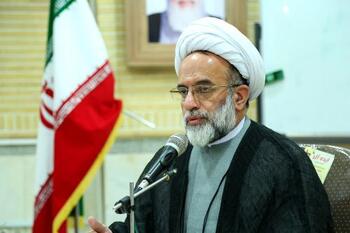In Indian society religious sentiment very high: Supreme Leader Representative in India
Supreme Leader Representative in India said, “In Indian society, although religious sentiment is very high, religious knowledge is low. In many cases, there are even shortcomings in Shiite culture. To solve this, superstitions, inappropriate customs, and habits must be avoided, and Shiite culture must be properly defined.”
The Conference “Study of the priorities and strategies for disseminating the teachings of the AhlulBayt (a.s.) in the international arena; with emphasis on the Indian Subcontinent, Southeast Asia, and Latin America regions” will be held on Wednesday, December 15, 2021, at 10:00 AM in the conference hall of the AhlulBayt (a.s.) World Assembly in Qom.
Speaking at the meeting, while describing the people of the Indian Subcontinent as pioneers in disseminating the teachings of the AhlulBayt (a.s.), Hojat al-Islam Mahdi Mahdavipour, the Representative of the Supreme Leader in India, said, “About 20,000 books in Urdu have been published in the subcontinent so far. Also, in the past, no country like India has been successful in disseminating the teachings of the AhlulBayt (a.s.) and defending the Family of Infallibility.”
“In India there are the greatest encyclopedia to defend the AhlulBayt (a.s.), “Abaqat al-Anwar”, by the late Allameh Mir Hamed Hussain in Lucknow, and also the book “Emad al-Islam” by Sayed Deldar Ali Ghofran Maab in 20 volumes. Today, a total of 50,000 manuscripts from India’s ancient scholars are available,” he added.
“The people of the subcontinent are extremely sensitive to the AhlulBayt (a.s.). Sometimes a book can cause tensions that maybe last for decades,” the representative of the Supreme Leader in India emphasized, “Therefore, in publishing and distributing books in the subcontinent, the sensitivities of the region must be taken into account.”
“If you want the books to be published in the scientific, academic and university communities of India, the teachings of the AhlulBayt (a.s.) must be presented in the form of social, political, family, and moral theories. That is, academic language should be considered, and this approach will be very much welcomed in the Indian scientific community,” Mahdavipour continued.
“The books of humanities, sociology, law, economics and psychology from the perspective of the AhlulBayt (a.s.) have been less translated in the subcontinent. The issue of Zekr and supplications is very important for the people of India. It will also be good if the supplications narrated from the AhlulBayt (a.s.) also be considered,” stated the Representative of the Supreme Leader in India.
“In the subcontinent, the mysticism is a dominant issue. The people are emotional there, therefore the issue of mourning (for the AhlulBayt) in the subcontinent is very important and is intertwined with the Shiite identity. Their relationship with Imam Hussain (a.s.) and the uprising of Ashura is a strong connection. Hindus, Sikhs, Shiites, and Sunnis in India tend to mystical discussions. In this regard, the translation of books containing prayers into Hindi and English will be very welcomed,” he said.
“Books should be up to date. The suspicions that are spreading in cyberspace today are unprecedented or have not been so widespread. Much work has been done in the subcontinent to respond to suspicions and dozens of books have been published in this regard. However, new suspicions must be monitored and scientifically answered,” Mahdavipour said, referring to new suspicions in cyberspace.
“If the capacity of Ashura and Arbaeen is used to create culture, it will be welcomed in the subcontinent. In introducing the Ashura uprising, any number of decisive and appropriate books written will be welcomed,” emphasized the representative of the Supreme Leader in India.
“Our duty is not just spreading the teachings of the AhlulBayt (a.s.), but to create a culture. Hojat al-Islam Mahdavipour added, “We need to study what weaknesses there are in terms of Islamic culture in any Muslim community. The Islamic Revolution of Iran revolutionized and influenced the culture of the society and its beliefs and traditions. In Indian society, while religious sentiment is very high, religious knowledge is low. In many cases, there are even shortcomings in Shiite culture. To solve this, superstitions, inappropriate customs, and habits must be avoided, and Shiite culture must be properly defined, and this is feasible through creation of intellectual flows and research.”
“The publication of a prolific magazine in Urdu and English about the AhlulBayt (a.s.) in the Indian subcontinent will be very influential,” said the representative of the Supreme Leader in India in the end.
Supreme Leader Representative in India said, “In Indian society, although religious sentiment is very high, religious knowledge is low. In many cases, there are even shortcomings in Shiite culture. To solve this, superstitions, inappropriate customs, and habits must be avoided, and Shiite culture must be properly defined.”
The Conference “Study of the priorities and strategies for disseminating the teachings of the AhlulBayt (a.s.) in the international arena; with emphasis on the Indian Subcontinent, Southeast Asia, and Latin America regions” will be held on Wednesday, December 15, 2021, at 10:00 AM in the conference hall of the AhlulBayt (a.s.) World Assembly in Qom.
Speaking at the meeting, while describing the people of the Indian Subcontinent as pioneers in disseminating the teachings of the AhlulBayt (a.s.), Hojat al-Islam Mahdi Mahdavipour, the Representative of the Supreme Leader in India, said, “About 20,000 books in Urdu have been published in the subcontinent so far. Also, in the past, no country like India has been successful in disseminating the teachings of the AhlulBayt (a.s.) and defending the Family of Infallibility.”
“In India there are the greatest encyclopedia to defend the AhlulBayt (a.s.), “Abaqat al-Anwar”, by the late Allameh Mir Hamed Hussain in Lucknow, and also the book “Emad al-Islam” by Sayed Deldar Ali Ghofran Maab in 20 volumes. Today, a total of 50,000 manuscripts from India’s ancient scholars are available,” he added.
“The people of the subcontinent are extremely sensitive to the AhlulBayt (a.s.). Sometimes a book can cause tensions that maybe last for decades,” the representative of the Supreme Leader in India emphasized, “Therefore, in publishing and distributing books in the subcontinent, the sensitivities of the region must be taken into account.”
“If you want the books to be published in the scientific, academic and university communities of India, the teachings of the AhlulBayt (a.s.) must be presented in the form of social, political, family, and moral theories. That is, academic language should be considered, and this approach will be very much welcomed in the Indian scientific community,” Mahdavipour continued.
“The books of humanities, sociology, law, economics and psychology from the perspective of the AhlulBayt (a.s.) have been less translated in the subcontinent. The issue of Zekr and supplications is very important for the people of India. It will also be good if the supplications narrated from the AhlulBayt (a.s.) also be considered,” stated the Representative of the Supreme Leader in India.
“In the subcontinent, the mysticism is a dominant issue. The people are emotional there, therefore the issue of mourning (for the AhlulBayt) in the subcontinent is very important and is intertwined with the Shiite identity. Their relationship with Imam Hussain (a.s.) and the uprising of Ashura is a strong connection. Hindus, Sikhs, Shiites, and Sunnis in India tend to mystical discussions. In this regard, the translation of books containing prayers into Hindi and English will be very welcomed,” he said.
“Books should be up to date. The suspicions that are spreading in cyberspace today are unprecedented or have not been so widespread. Much work has been done in the subcontinent to respond to suspicions and dozens of books have been published in this regard. However, new suspicions must be monitored and scientifically answered,” Mahdavipour said, referring to new suspicions in cyberspace.
“If the capacity of Ashura and Arbaeen is used to create culture, it will be welcomed in the subcontinent. In introducing the Ashura uprising, any number of decisive and appropriate books written will be welcomed,” emphasized the representative of the Supreme Leader in India.
“Our duty is not just spreading the teachings of the AhlulBayt (a.s.), but to create a culture. Hojat al-Islam Mahdavipour added, “We need to study what weaknesses there are in terms of Islamic culture in any Muslim community. The Islamic Revolution of Iran revolutionized and influenced the culture of the society and its beliefs and traditions. In Indian society, while religious sentiment is very high, religious knowledge is low. In many cases, there are even shortcomings in Shiite culture. To solve this, superstitions, inappropriate customs, and habits must be avoided, and Shiite culture must be properly defined, and this is feasible through creation of intellectual flows and research.”
“The publication of a prolific magazine in Urdu and English about the AhlulBayt (a.s.) in the Indian subcontinent will be very influential,” said the representative of the Supreme Leader in India in the end.






